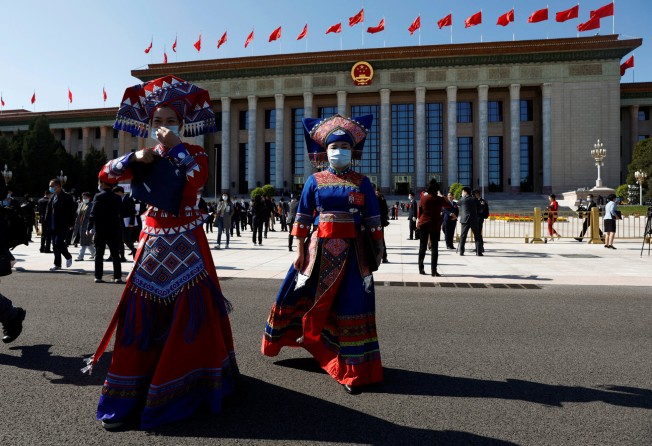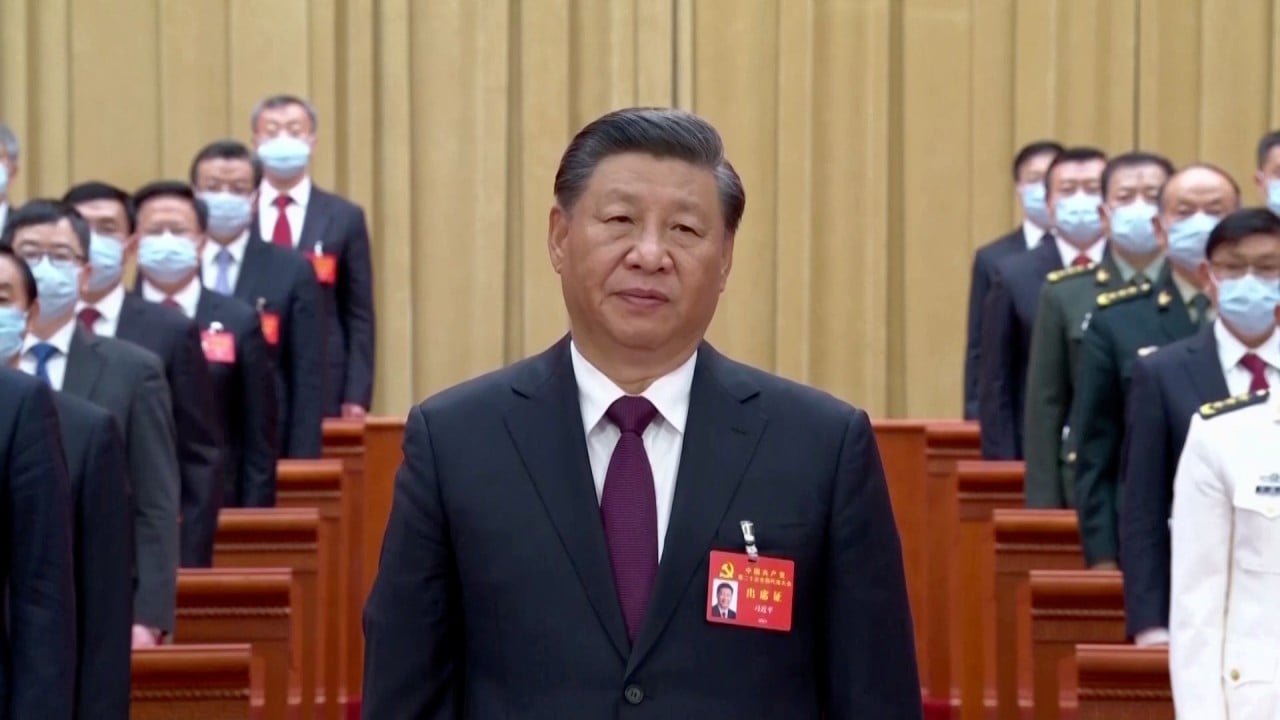Chinese President Xi ‘personally’ vetted selection of top Communist Party team, Xinhua says
- Report marks first-ever confirmation by state media of Xi Jinping’s direct involvement in selection of Central Committee
- Loyalty to Xi seen as top criteria, alongside ability to bypass Western sanctions with hi-tech breakthroughs, lengthy article says

One of the criteria for President Xi Jinping in picking his top team was the candidates’ ability to “struggle” with the West to circumvent sanctions and safeguard national security, according to state news agency Xinhua.
The report came as the line-ups for the new Central Committee, which will steer national policymaking for the next five years, and top corruption watchdog, the Central Commission for Discipline Inspection, were revealed at the close of the 20th Communist Party congress on Saturday.
The new batch of 376 full and alternate Central Committee members and the 133-strong disciplinary commission form the backbone of the party’s rule. Xi’s core team, the 24-member Politburo, comes from among the Central Committee members.
In a lengthy report on Sunday, Xinhua expounded on how the 300-odd top leaders were selected through careful interviews and screening by dozens of inspection teams sent by Xi, who headed a preparatory committee for the party congress.
Starting in July last year, the teams visited local governments, central government departments, state enterprises and military units in a drive to select candidates for these elite party bodies.
“Party secretary Xi Jinping personally took charge of the planning and personally took charge of the gatekeeping,” the report said.
This is the first time that Chinese state media has explicitly confirmed Xi’s direct involvement in criteria-setting for and screening of Central Committee members.
A Xinhua article on the selection of the Central Committee and disciplinary commission in the run-up to the 19th party congress five years ago said Xi headed the preparatory committee and gave instructions on the selection process and criteria.
Its latest report makes clear that, among all the criteria, loyalty to Xi comes first.
The inspection teams would first check if a candidate had the “political awareness, discernment, understanding and execution power” to stay loyal to Xi and his ideas, in accordance with the “Two Establishes” – a Communist catchphrase referring to having Xi as the core leader and his ideas as the bedrock of the party’s guiding principles.
“[The inspection team are to check if] candidates are highly aligned with the core leadership of comrade Xi Jinping in terms of their thoughts, political stance and actions; whether they will unswervingly execute the policies and plans of the party central leadership; and whether they will strictly abide by the party’s political discipline,” Xinhua said.
Candidates must also be smart at understanding politics but at the same time simple-minded in their loyalty to Xi, the report added.
But beyond loyalty, inspectors would also look for the candidates’ actual ability to implement Xi’s policies and achieve the goals laid down by him.
For some, the deciding factor was their ability to bring about breakthroughs in cutting-edge technologies subject to export bans by Western countries, the article said.
“Some inspection teams … would focus on whether the candidates have the courage and ability to ‘struggle’ against Western sanctions and safeguard national security,” it said.
“Whether they could swim against the tide and had the determination to promote technological innovations and overcome bottlenecks in research related to stranglehold technologies [were important criteria].”
Stranglehold technologies refer to core know-hows where China must rely on imports, because it cannot produce items of sufficient quality and quantity.
Chipmaking, photolithography machines that manufacture chips and aircraft engines are among the 35 “stranglehold technologies” listed by the Ministry of Science and Technology.
Five of the 24 members of the new Politburo are experts in hi-tech fields.
For some candidates, the defining criteria was their ability to achieve policy goals set by Xi, such as poverty alleviation, environmental protection and regional development.
Some inspection teams conducted site visits to check if the candidates performed well in implementing Covid-19 control measures, as well as mine safety, emergency relief and flood prevention regulations, Xinhua said.
Personal wealth was also under the scanner, with the inspection team carrying out thorough investigations into property ownership, and business activities by a candidate’s spouse and children, to ensure that corrupt cadres would not make the list.
As many as 20 nominees failed to pass the inspection process carried out by the party’s corruption watchdog, and were therefore not included in the candidate pool, according to the report.
While there are unwritten rules about retirement age for top party and state leaders, under Xi, rules on age limit are no longer a decisive factor.
A relatively older candidate was able to beat a younger rival with good reviews from his supervisor, because the former had worked in impoverished areas for years and enjoyed a good reputation among the public, the Xinhua article said.
Five years ago, Xi abandoned the practice of having hundreds of political elites nominate each other, following a series of vote-rigging scandals.
State media reports at the time said there were attempts to manipulate the 17th and 18th party congresses, held in 2007 and 2012, by three senior officials – former security tsar Zhou Yongkang; former chief of staff to president Hu Jintao, Ling Jihua; and former Chongqing party boss Sun Zhengcai – through vote-buying in internal elections. The party also accused the disgraced trio of plotting a coup against Xi.
The details of the scandal was reported by Xinhua days after the 19th party congress closed in 2017.
While Sunday’s Xinhua report did not mention them, it cited vote-rigging scandals at lower-level party standing committees in Liaoning, Sichuan and Henan provinces as “lessons” against the old votes-based nomination mechanism.
It said the new process of consultation, interviews and selection had successfully stopped the role of bribery in the process.
A total of 45 teams were sent in three batches to 31 provincial and city governments, as well as 124 central government departments and state enterprises for inspections, the report said. Another eight teams were dispatched to check out candidates in 25 military units.
On average, each team held 1,400 interviews at the local level, while teams responsible for inspecting candidates in the central government conducted almost 10,000 interviews each.
The average age of the 20th Central Committee, full and alternate members combined, is 57.2 years. Only 33 of them are women and 32 are from the ethnic minorities. Over 98 per cent are university degree holders and 29 are members of the Chinese academies of science and engineering.

The bending of some of the old rules has made it more difficult for observers to predict who will make it to the top echelons of power.
Among surprise inclusions in the present Central Committee is the 66-year-old president of the Chinese Academy of Social Sciences, Shi Taifeng, who is also the former party boss of Inner Mongolia and Ningxia.
Shi, despite reaching the usual retirement age of 65 for provincial party secretaries and ministers, was named as a member of the Politburo, apart from becoming a member of the Central Committee’s Secretariat, in charge of the day-to-day operations of the party’s top echelons.
Shi is most well-known for his massive retrospective anti-corruption campaign in Inner Mongolia’s coal mining industry in 2020, which resulted in probes against almost 1,000 people and recouped 52 billion yuan (US$7.18 billion) of economic losses for the country.
However, there were some glaring omissions as well. Ningbo party boss Tang Yijun, an alternate member of the previous Central Committee, and Jiang Jinquan, director of the Central Committee’s Policy Research Office, were not on any of the new lists.
Tang was an assistant to Xi when he was the Zhejiang party boss, while Jiang is well-known as Xi’s ideological point man and frequently seen among the president’s entourage during his domestic trips.
